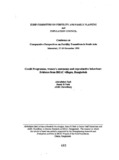| dc.contributor.author | Hadi, Abdullahel | |
| dc.contributor.author | Nath, Samir R | |
| dc.contributor.author | Chowdhury, AMR | |
| dc.date.accessioned | 2019-11-11T05:34:50Z | |
| dc.date.available | 2019-11-11T05:34:50Z | |
| dc.date.issued | 1996-12 | |
| dc.identifier.citation | Hadi, A., Nath, S. R., & Chowdhury, A. (1996, December). Credit programme, women’s autonomy a reproductive behaviour evidence from BRAC villages, Bangladesh. Research Reports (1996): Health Studies, Vol - XX, 403–423. | en_US |
| dc.identifier.uri | http://hdl.handle.net/10361/12896 | |
| dc.description.abstract | This paper investigates the role of women's autonomy on their acceptance of contraceptive
method in 87 BRAC villages in Manikganj district of Bangladesh. Data for this study were
obtained from 1995 sample survey of married women of reproductive age in these villages.
Findings reveal that women's autonomy, as measured by the extent to which she believes that the
wife should have a decision-making role in five different areas of family life, is positively
associated with contraceptive use. While socioeconomic differentials in the acceptance of
contraceptive are noticeable in terms of age, number of children ever born, years of schooling.
exposure to mass media. land size and occupation of husband, the contraceptive practice among
women involved in credit programme is found significantly higher than those not similarly
involved. The multivmiate analysis reveals that participation in credit programmes is positively
associated with women's empowerment when socioeconomic differentials are taken into account
On the other hand, women having high autonomy score are nearly 36 percent more likely to use
contraceptives (p<.OS) than those having low autonomy score, controlling for age and number of
children ever born of the women. When other factors such as involvement in credit programme.
years of schooling. household ownership of land. occupation of husband and exposure to mass
media are systematically added to the regression equation, the influence of women's autonomy on
contraceptive usc remains high with the same level of significance. The paper concludes that
credit-based income generating programme has the potential to bring a significant change in
reproductive behaviour of women through increased autonomy. | en_US |
| dc.language.iso | en | en_US |
| dc.publisher | BRAC Research and Evaluation Division (RED) | en_US |
| dc.subject | Credit programme | en_US |
| dc.subject | Women's autonomy | en_US |
| dc.subject | Reproductive behaviour | en_US |
| dc.subject | BRAC villages | en_US |
| dc.subject.lcsh | Health, Nutrition, and Population Program (BRAC) | |
| dc.subject.lcsh | Women's rights | |
| dc.title | Credit programme, women's autonomy a reproductive behaviour evidence from BRAC villages, Bangladesh | en_US |
| dc.type | Research report | en_US |

